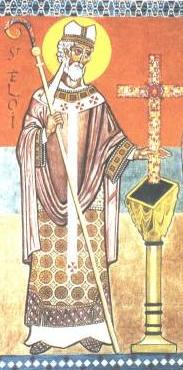Saint
Eloi was born to a Christian family near Limoges in Gaul (modern-day
France) in 588.
He became
a goldsmith, worked for the royal mint, and in time became a
trusted counselor of King Chlothar II. Despite (or because
of) the honors and riches that surrounded him, Eligius came
to despise all of them and gave away all his property but
what he considered essential for everyday life.
He devoted
all his income to almsgiving and to ransoming prisoners of
all nationalities from the slave markets. Many of these
became his attendants and disciples in gratitude.
Eligius'
compassion became so well-known that when visitors asked for
directions to his house, they would be told 'Look for the
house surrounded by a crowd of beggars. That is where Lord
Eligius lives.'
The Saint
washed the feet of the poor who came to him, served them at
his own table and fed himself on what they left. If he ran
out of money, he would give away furniture or even his
clothing.
When King Chlothar died in
629, Eligius became the counselor of his successor King
Dagobert I.
He founded
monasteries for men at Solignac and for women in Paris,
telling the King: 'These are the ladders by which we will
both be able to climb up to the Kingdom of Heaven.'
As a royal
counselor he helped to re-establish peace between France and
Brittany, and improved the law of the kingdom to make it
more just.
When Dagobert died in 639,
Eligius devoted himself entirely to the service of God as
Bishop of Noyon in Flanders. His diocese was still mostly
pagan, and Eligius traveled untiringly to preach the Gospel
of Christ, often at risk of his life.
Having
foreseen his approaching death, Saint Eligius reposed in
peace in 660. When his tomb was opened a year later, his
body was found incorrupt and gave forth a fragrant scent.

